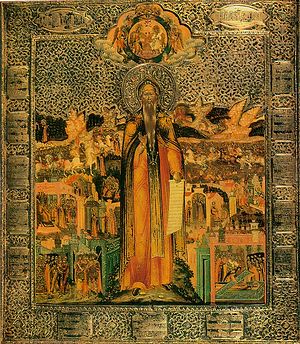Saint Isaac lived during the fourth century, received monastic tonsure and pursued ascetic labors in the desert. During the reign of the emperor Valens (364-378), a zealous adherent of the Arian heresy, there was a persecution of the Orthodox, and churches were closed and destroyed.
Hearing of the persecution, Saint Isaac left the wilderness and went to Constantinople to console and encourage the Orthodox, and to fight against the heretics. At that time, barbarian Goths along the River Danube were making war against the Empire. They seized Thrace and advanced toward Constantinople.
When the emperor Valens was leaving the capital with his soldiers, Saint Isaac cried out, “Emperor, unlock the churches of the Orthodox, and then the Lord will aid you!” But the emperor, disdaining the words of the monk, confidently continued on his way. The saint repeated his request and prophecy three times. The angry emperor ordered Saint Isaac to be thrown into a deep ravine, filled with thorns and mud, from which it was impossible to escape.
Saint Isaac remained alive by God’s help, and he emerged, overtook the emperor and said, “You wanted to destroy me, but three angels pulled me from the mire. Hear me, open up the churches for the Orthodox and you shall defeat the enemy. If, however, you do not heed me, then you shall not return. You will be captured and burned alive.” The emperor was astonished at the saint’s boldness and ordered his attendants Saturninus and Victor to take the monk and hold him in prison until his return.
Saint Isaac’s prophecy was soon fulfilled. The Goths defeated and pursued the Greek army. The emperor and his Arian generals took refuge in a barn filled with straw, and the attackers set it afire. After receiving news of the emperor’s death, they released Saint Isaac and honored him as a prophet.
Then the holy Emperor Theodosius the Great (379-395) came to the throne. On the advice of Saturninus and Victor, he summoned the Elder, treating him with great respect. Obeying his instructions, he banished the Arians from Constantinople and restored the churches to the Orthodox. Saint Isaac wanted to return to his desert, but Saturninus and Victor begged him not to leave the city, but to remain and protect it by his prayers.
Saturninus built a monastery for the saint in Constantinople, where monks gathered around him. Saint Isaac was the monastery’s igumen and spiritual guide. He also nourished laypeople, and helped many of the poor and suffering.
When he had reached an advanced age, Saint Isaac made Saint Dalmatus (August 3) igumen. The monastery was later named for Dalmatus.
Saint Isaac died in the year 383, and his memory is also celebrated on May 30.

